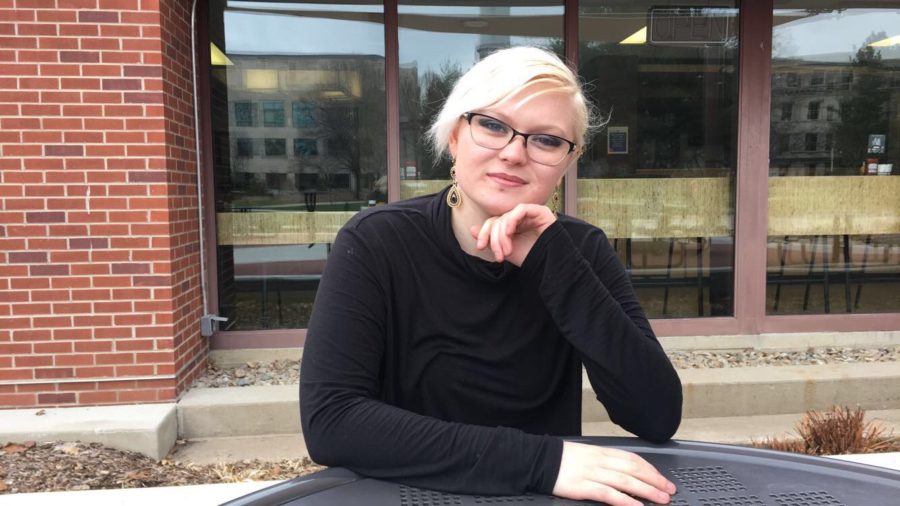Understanding, accepting autism for what it is
April 1, 2017
Brandon Arkland, senior in child, adult and family services, grew up in Webster City, Iowa. He was a year-round athlete throughout his middle and high school years, bearing an array of positions and duties with his town’s recreational services.
It was his job as a youth coach, specifically, that sparked his passion for helping others. Although this budding ambition to support people was very prominent, the task was not always easy for Arkland.
At the age of 4, Arkland was diagnosed with autism by the University of Iowa’s Stead Family Children’s Hospital Autism Center.
Autism spectrum disorder, also known as ASD, is a complex developmental disability. Signs typically appear during early childhood and affect a person’s ability to communicate and interact with others.
ASD is defined by a certain set of behaviors and is a spectrum condition, meaning it affects individuals differently to varying degrees, according to autism-society.org.
“They labeled me as intellectually disabled and said I had a really low IQ,” Arkland said. “They told my parents that they should expect hardly anything from me. Maybe I could be a janitor.”
That is not exactly what he had in mind, however. Arkland noted how the support and hard work he received from people in his life, especially his parents, had a lot to do with what he has accomplished.
Arkland will graduate in May. He has served on many boards and committees that advocate for autism. He has also given speeches and has helped coordinate autism awareness events. Arkland will begin his term as co-chair for the Autism State Council later this year.
“What I want people to know is I don’t consider [autism] a disability. I consider it a lifestyle,” Arkland said. “Yeah, there are things I struggle with, but everyone struggles with something. It’s an ability, not a disability.”
A senior-level speech class assignment gave Arkland his first chance to publicly speak out about what it is like living with Autism.
“After I started advocating for myself, I gained the confidence to start new things,” Arkland said. “Besides realizing I was capable of doing anything I wanted to, it was also a newfound confidence in being included.”
Ian Allen, resource coordinator in the Student Disability Resources Office (SDR), has a similar view on the importance of the inclusion of students with autism. Autism is categorized as a learning disability at Iowa State. SDR focuses on accommodating for certain academic needs that may need to be met.
“[We need to] be more proactive; do things to go out of our way to provide an inclusive campus and an inclusive Iowa State experience,” Allen said. “It’s really important that we change stereotypes around people with autism. We need to look at where they come from and challenge them. We need to treat [people with autism] as people rather than a disability. We need to acknowledge and celebrate the expertise that they develop in areas that might be different [than ours]. Embrace the differences.”
But given the spectrum of autism, each student with the condition faces different challenges. Though learning disadvantages exist, there is also the challenge of navigating social circumstances.
Allen said that autism makes it harder for people to verbalize and communicate and sometimes hinders recognition and awareness of cues that otherwise might come more readily.
“The socialization piece may be even bigger, but while we have the support toward the academic part, we don’t necessarily have specialized instruction to give when it comes to social interaction,” Allen said.
Carissa Widseth attested for said social challenges.
Widseth, junior in aerospace engineering, hails from Waconia, Minnesota.
Widseth spoke on how she has had to work harder to learn to understand tones and social contexts that others might otherwise take for granted. These included the ability to communicate and realize what is and isn’t “socially acceptable.”
“There was a really great special needs program that I was involved in in elementary school,” Widseth said. “Before I realized being autistic makes you a social outcast, which makes it harder to make friends, because it’s viewed as a bad thing. I was bullied until I learned how to act ‘neuro-typical.’ One thing I haven’t gotten down is eye contact.”
No matter the difficulties Widseth has faced, she has not let these challenges derail her in pursuing her passions. Aerospace engineering means long days of studying and labs.
Widseth loves spending time studying social interaction and effective communication. She said this has helped her grow and overcome many struggles she has faced while dealing with relationships.
“Human interest is definitely a huge interest of mine,” Widseth said. “That and Star Trek.”
She went on to speak about the importance of promoting a platform for individuals with autism to talk about their experiences. She said that awareness of the widespread spectrum of ASD is vital to understanding the condition.
“I would rather it be autism acceptance month, but we aren’t there yet,” Widseth said when asked about the importance of autism awareness. “[Autism awareness] is not quite as important as autism acceptance. What is important is accepting autism for what it is, how it hinders and how it helps.”
Autism Awareness Month was first nationally declared by the Autism Society in April 1970, with the aim of educating the public about autism.
The month is about accepting and including people with autism within school systems and communities. It was established with the hope of achieving widespread appreciation and understanding of the unique characteristics that people with autism possess.







